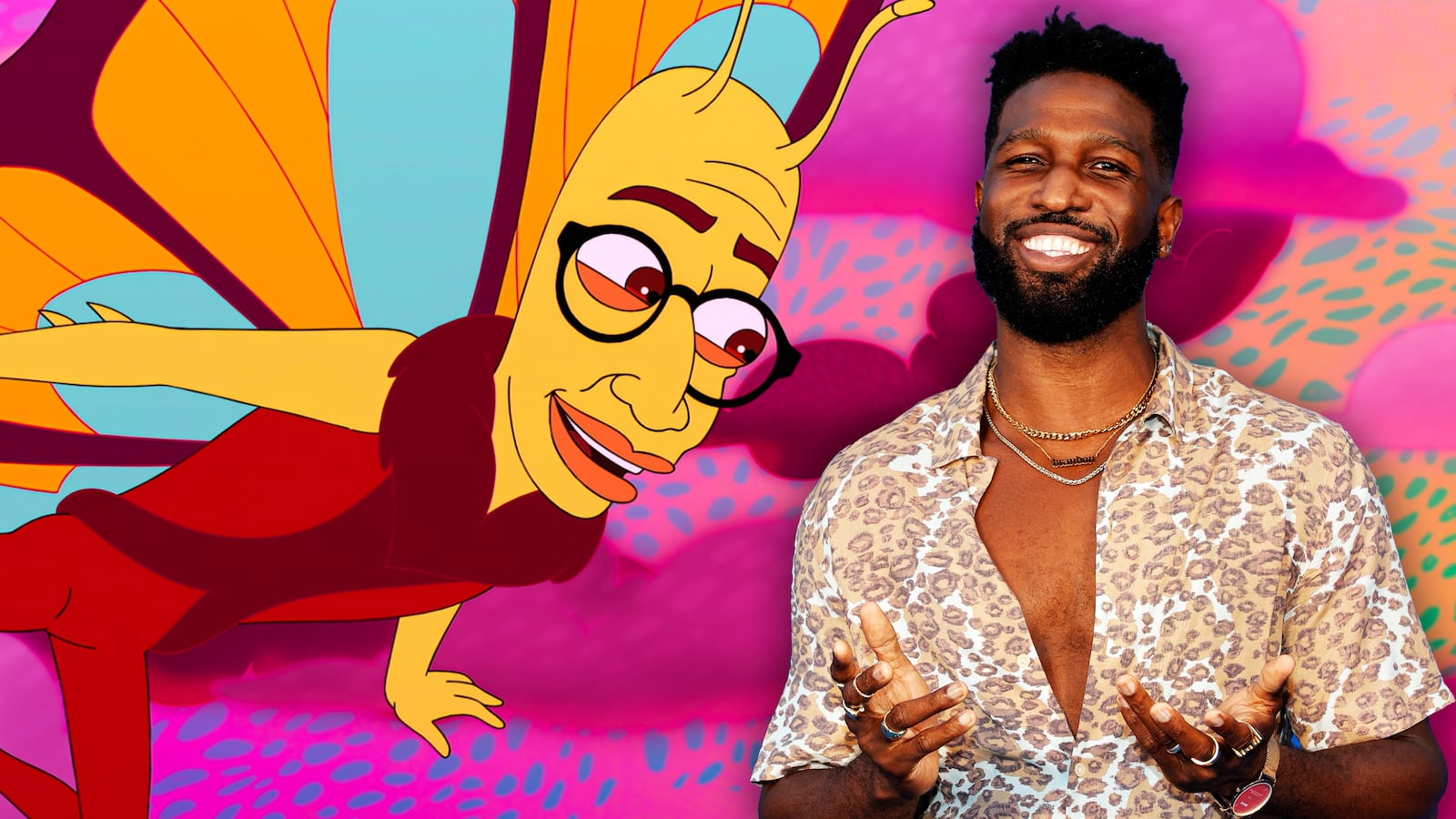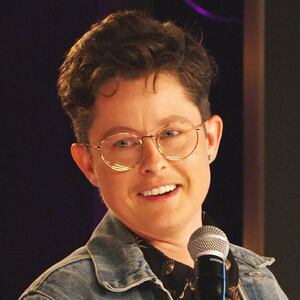From his breakthrough gig as a writer for Netflix’s Big Mouth to his breakout role as Walter the Lovebug on the new spinoff Human Resources, Brandon Kyle Goodman has a lot to say about what it means to be Black and gender-nonconforming in comedy right now.
In this bonus episode of The Last Laugh podcast, Goodman opens up about how he knew his only path to pop culture success would be writing for himself, reveals how his own coming out story came to life on Big Mouth, and shares his reaction to Netflix’s handling of the Dave Chappelle debacle.
During his own appearance on this podcast back in the fall of 2019, Big Mouth creator Nick Kroll teased Human Resources, which starts streaming today on Netflix, as a “workplace comedy set in the world of the monsters.” He compared the show to The Office, but populated with Hormone Monsters, Shame Wizards, Anxiety Mosquitos, and other metaphorical creatures that live inside our heads. In addition to Lovebugs like Walter, the show has added a Logic Rock voiced by Randall Park, an Addiction Angel voiced by Hugh Jackman, an Ambition Gremlin voiced by Rosie Perez, and many others.
When Goodman came in for his first day as a writer on season 5 of Big Mouth, he says, “There was already talk about introducing these two new characters, the Lovebugs, and the concept that we would meet them in season 5 and they would take us into this spinoff.” But even as they started fleshing out these new creatures, Goodman had no idea he would get the chance to actually play one of them.
They had some bigger names in mind for Walter, but Goodman started reading his lines during the table reads, fell in love with the character, and never looked back.
“The roster of the cast is quite intimidating,” he says. “So I wasn’t quite sure if I would be added to that list, but it was very exciting that they trusted me enough to do that. So I’m just honored to be on the ride.
“I say that Walter is the definition of love and chaos together as one,” Goodman adds. “Your best friend who, sometimes you’ve got to hold the hair back because they drink a little too much. They have the best intentions, but sometimes you’ve got to check ‘em.”
Below is an edited excerpt from our conversation. You can listen to the whole thing—including stories about playing “hot priest” Andrew Scott’s husband on ‘Modern Love’ and his upcoming book of essays ‘You Gotta Be You: How to Embrace This Messy Life and Step Into Who You Really Are’—right now by subscribing to The Last Laugh on Apple Podcasts, Spotify, Google, Stitcher, Amazon Music, or wherever you get your podcasts, and be the first to hear new episodes when they are released every Tuesday.
Big Mouth is a really popular show among young people despite how dirty it is. And maybe that’s why they like it in some cases. But it does bring up the idea of representation for young kids watching it, compared to what you or I had growing up on TV. How do you think about that in terms of the importance of what people are able to see?
It’s vastly important. I mean, growing up, especially as queer people, you latch onto the Disney villains because they are the most queer.
That’s all you get.
Yes! You kind of see yourself in Ursula, you kind of see yourself in Jafar. And there’s the mindfuck of them being the bad guy, but there’s something about the way that they move that feels extra queer. So it’s really nice to know that there’s this show and other shows that are coming out that are allowing us to not have to be the villain, but actually be people and be humans having a human experience, where queerness is part of it, but that’s not the storyline. And we really try to push that, which is why it's exciting that [the trans character] Natalie comes back on Human Resources. And as you know, she’s just there. I don’t think there’s ever a mention of her gender identity.
Yeah, it’s not about her being trans.
No, she’s just a sister in this family going through something with her grandmother and that, to me, is the ideal. That’s where I hope all television and movies get to, where we don’t have to have the storyline be about the trauma of somebody coming out or about their race or whatever, but that they just get to exist. And obviously, labels of their identity will influence how they reckon with it, but that’s not their story.
We just had River Butcher on this podcast and we were talking about trans issues and they/them pronouns and all of this stuff that has become sort of a punching bag in comedy. But then there are comedians like River, or what’s happening on Big Mouth, that’s kind of pushing back against that. And I’m just wondering if you think about that at all as someone who does use they/them pronouns in addition to he/him. Is it a responsibility that you have to respond to some of the more hateful stuff out there?
I guess I think my response is my work, as opposed to responding directly to whatever the hate is. If I can continue to exist and stand in my truth and put out the work that means the most to me, then there’s that representation of somebody who’s non-binary and who’s Black and who uses they/them pronouns. And so for anyone who does the same, there’s a reflection of that as opposed to getting into a fight with somebody who just may want the clicks, may not have been doing their mental health work, may be on their own bullshit. I don’t find value in arguing or engaging with that. I think there are times when you have to, and I want to pick those moments really specifically. But in general, my course of action is to just continue showing up as myself, continue being as visible as possible. Because as you said earlier, growing up there weren’t a lot of queer characters, let alone queer people, in the public space to be like, “Oh, I’m kind of like them” or “I see myself in them.” And so I’m really interested in being part of that collective that’s expanding the representation by just being and by showing up.
During the uproar specifically over the Dave Chappelle special on Netflix, one thing that happened was that Netflix [CEO Ted Sarandos] actually pointed to shows like Big Mouth and Sex Education and said essentially, “Look, we also are doing this good thing,” seemingly as a way to defend what was happening with Chappelle. Did you have any reaction to that?
Yeah, I mean, I’m going to be very conscious about how I answer this because—listen, I think that corporations are gonna corporate. When you are a network, you’re going to say what needs to be said to handle the business. But inside of that business are people. And there are a lot of people that make up Big Mouth and that make up Netflix. And so there was a lot of pain that was experienced and felt. And I do think that there’s still value in some of the content that does exist. There is value in Big Mouth existing, there is value in Sex Education existing. We can’t pull away from the value of that while reckoning with this other thing. So yes, I’m so glad that these other shows with representation exist while also being able to say, I want to hold you accountable for this other thing that is harmful. And how do we have that conversation? Not excuse it with the other shows, but actually say, “Yeah, good job over here, but also let’s talk about this particular thing.” And I think there needs to be more of that. Let’s actually have the real conversation here. How are certain things still harmful? No one and no network and no company is perfect. So let’s acknowledge that and have those conversations so that we can do better.
Yeah, I think there was this sentiment out there that, “It’s just jokes, how could it be harmful? It’s just words.” And that, I don’t think, rings true for a lot of people.
No, it’s not. I think about words all the time as a writer, obviously. I remember this episode of Family Matters that kind of changed my trajectory as a kid, where I think Steve is being bullied, as usual. But I think it’s a little heavier in one of these episodes. And I think Carl is part of it. And at the end of it, Carl says like, “‘Sticks and stones may break my bones, but words will never hurt me’ isn’t true,” that words do hurt, and they do matter. That was kind of the lesson of that episode. That’s always stayed with me. So I do think when you’re making jokes, words matter. And there are jokes that are harmful. The idea of saying “jokes are jokes,” I think, is kind of lazy. And I don’t mean that in a disrespectful way. I think there’s just a blinding and an ego and a numbing, especially if you’re not on the receiving end of it. I think for a joke to be a joke, we should all be in on it, we should all be able to enjoy it. It’s not about being politically correct. If I think about 20, 30, 40 years ago, there were white comedians saying things that were quite inappropriate, that were harmful, that we wouldn’t say, “Oh, well, that’s just a joke.” Today, we’d be like, “No, that was fucking racist.” So the same is true today when we’re talking about gender and sexuality and these things that may be newer to some people, where we get to say, “No, that’s actually quite harmful and not funny.” It doesn’t mean that you’re not funny, it doesn’t mean that you’re a terrible comedian now. It just means that that particular joke might not be the one to keep in your set.
Yeah, and if something like Big Mouth can have a positive effect on society through jokes, then something else could have a negative effect on society through jokes.
Yes, absolutely. And we’re not always going to get it right. And that’s OK. I think the reckoning here, especially inside of comedy, the cancel culture, and all of that stuff, especially in terms of what was happening in my place of work at Netflix, I think a lot of the activists weren’t saying, “Cancel this person.” That wasn’t the conversation. It was, let’s have a conversation about why this might be harmful, why we might do something else moving forward. That’s more impactful. Because we’re all fans of these comedians, we’ve all grown up on them, they obviously influence our comedy. But I still think we get to say, “Hey, this thing, you might want to look at it through a different lens.” And I think it’s the responsibility of the comedian to say, “OK, I’m going to let that in and listen to it. And if you are telling me it hurts, I want to hear that. And I want to adjust accordingly.”
And hopefully that’s what people will do, but they don’t always do it.
They don’t always do it, but my hope is that more and more people will take that stance.
Listen to the episode now and subscribe to ‘The Last Laugh’ on Apple Podcasts, Spotify, Google, Stitcher, Amazon Music, or wherever you get your podcasts, and be the first to hear new episodes when they are released every Tuesday.


